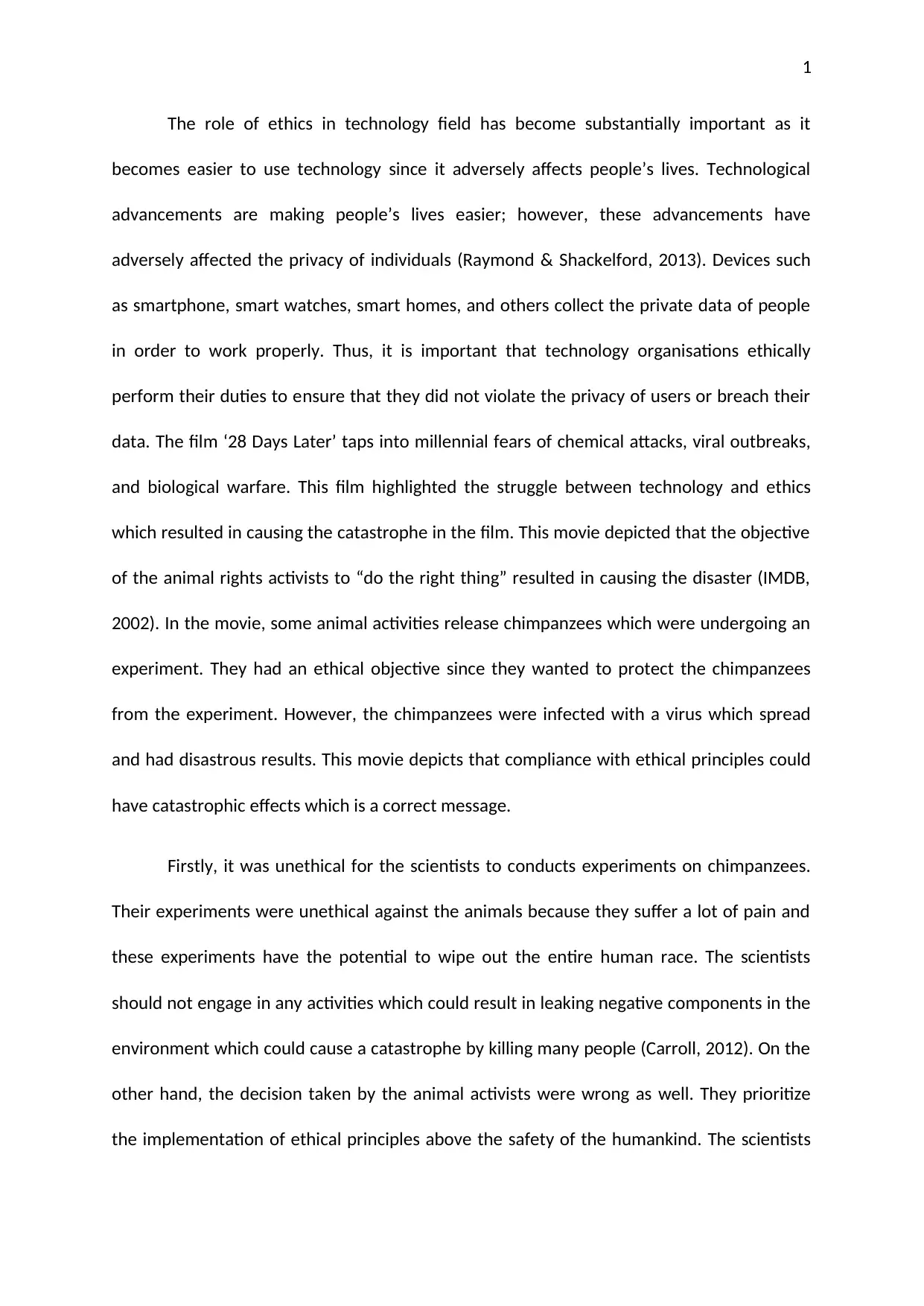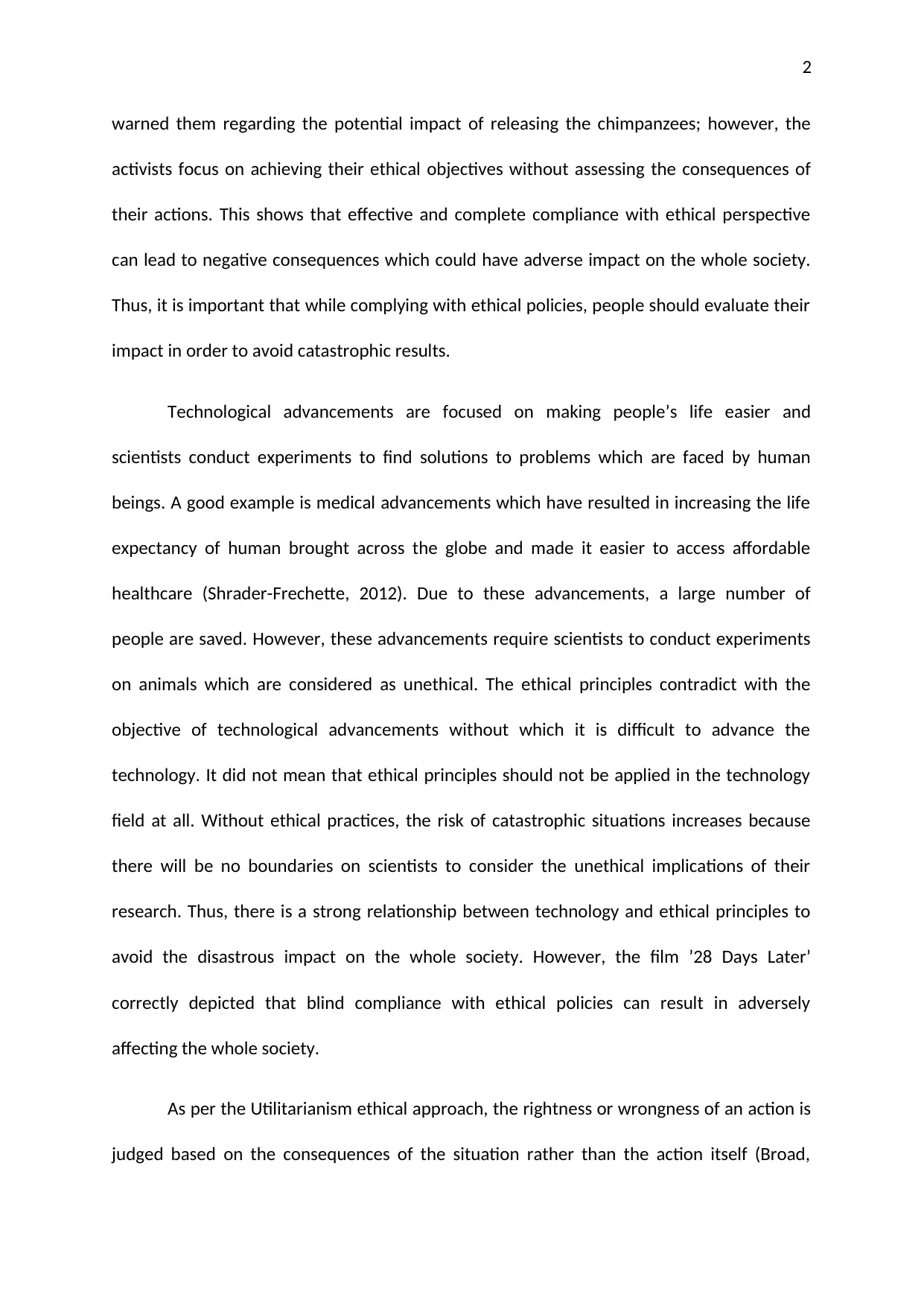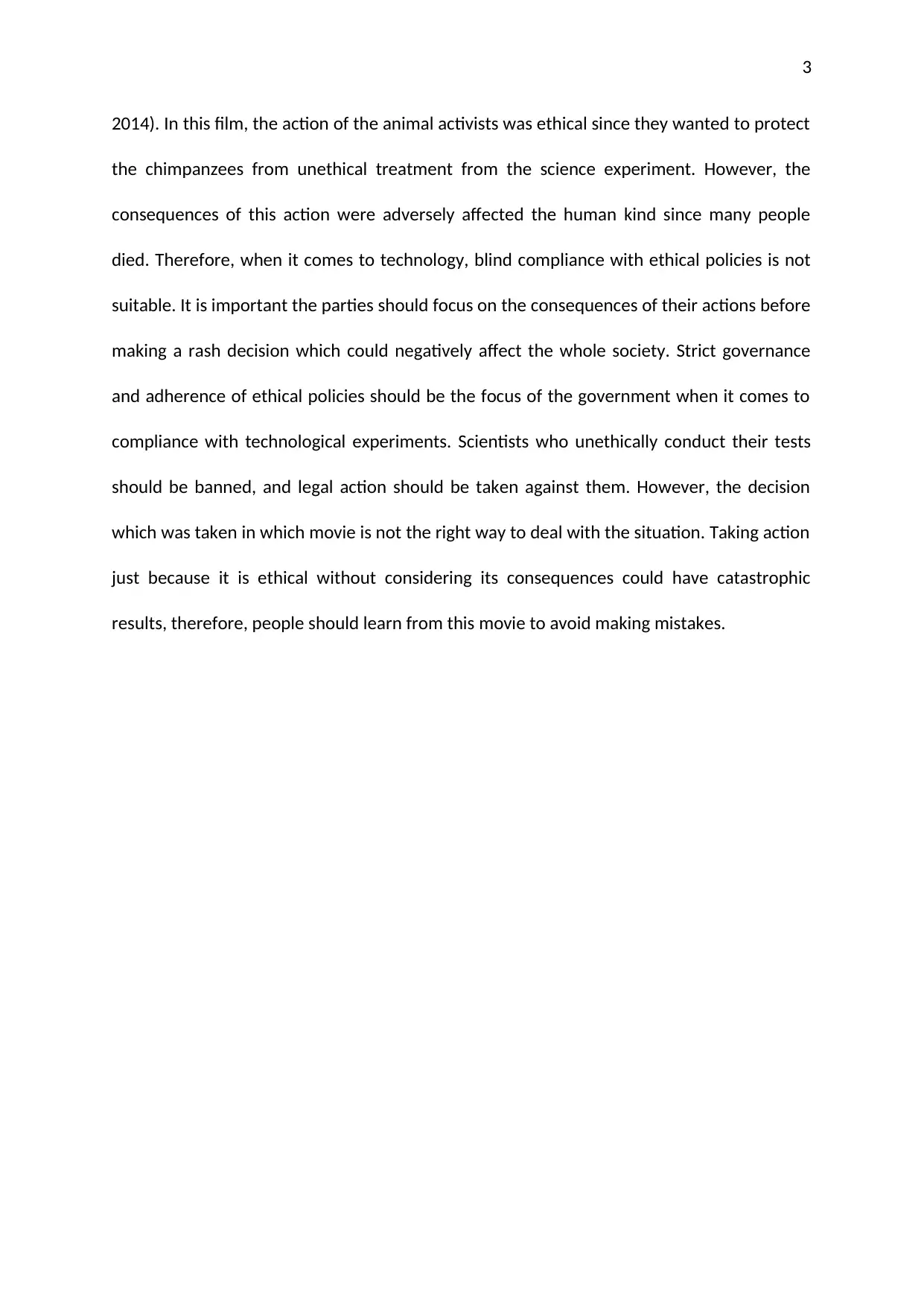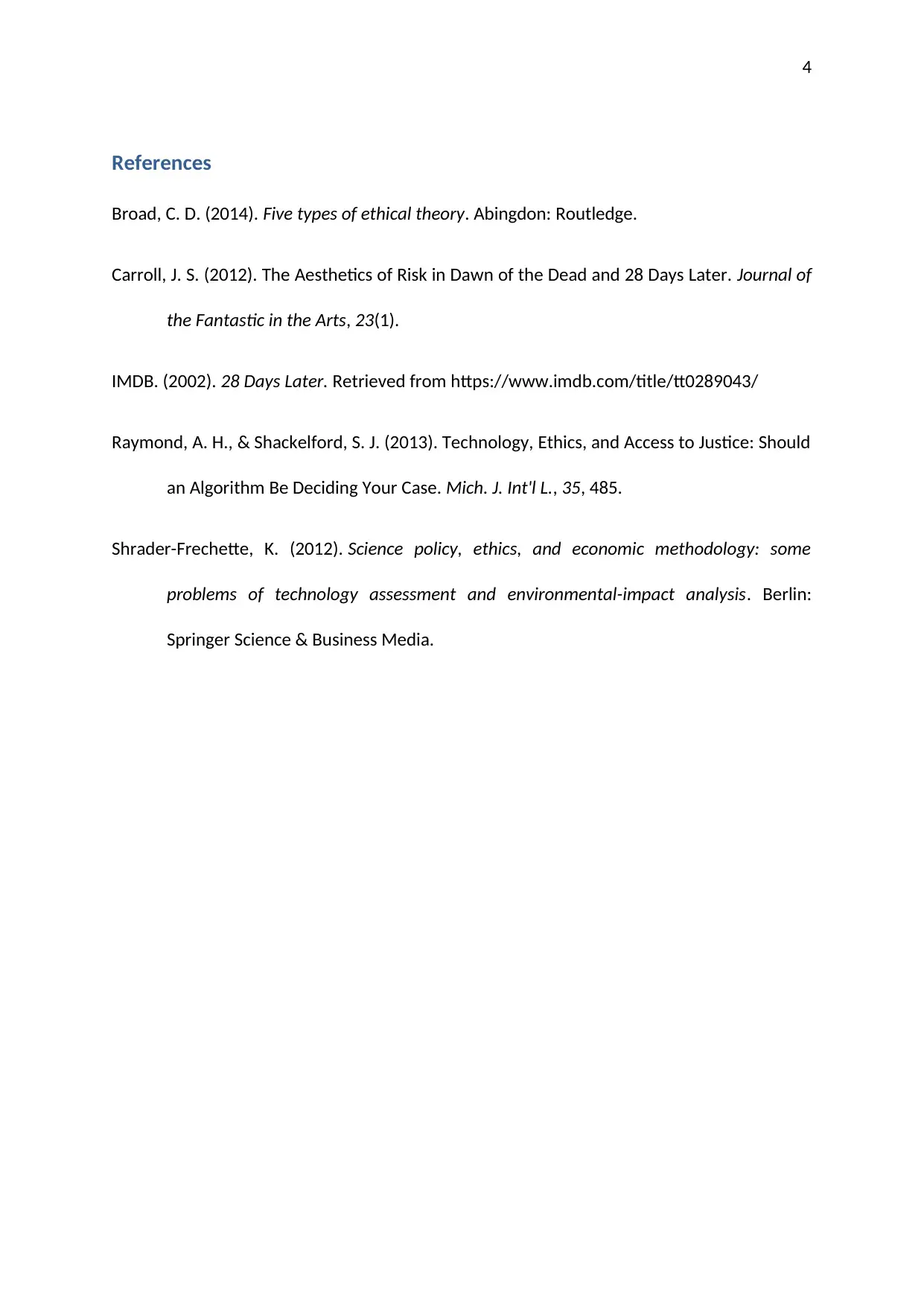Exploring Ethics and Tech in '28 Days Later' - A Midterm Analysis
VerifiedAdded on 2023/06/04
|5
|1001
|258
Essay
AI Summary
This essay examines the film '28 Days Later' through the lens of ethics and technology, arguing that the movie highlights the potential for catastrophic outcomes when ethical principles are blindly followed without considering the broader consequences. The analysis delves into the actions of both the scientists conducting experiments on chimpanzees and the animal rights activists who released the infected animals, ultimately suggesting that a balance between ethical considerations and practical risk assessment is crucial in technological advancements. The essay also touches upon the Utilitarianism ethical approach, emphasizing the importance of evaluating actions based on their consequences rather than their inherent morality. The student emphasizes that Desklib offers a variety of past papers and solved assignments for students.

0
Thinking Through Zombies
Thinking Through Zombies
Paraphrase This Document
Need a fresh take? Get an instant paraphrase of this document with our AI Paraphraser

1
The role of ethics in technology field has become substantially important as it
becomes easier to use technology since it adversely affects people’s lives. Technological
advancements are making people’s lives easier; however, these advancements have
adversely affected the privacy of individuals (Raymond & Shackelford, 2013). Devices such
as smartphone, smart watches, smart homes, and others collect the private data of people
in order to work properly. Thus, it is important that technology organisations ethically
perform their duties to ensure that they did not violate the privacy of users or breach their
data. The film ‘28 Days Later’ taps into millennial fears of chemical attacks, viral outbreaks,
and biological warfare. This film highlighted the struggle between technology and ethics
which resulted in causing the catastrophe in the film. This movie depicted that the objective
of the animal rights activists to “do the right thing” resulted in causing the disaster (IMDB,
2002). In the movie, some animal activities release chimpanzees which were undergoing an
experiment. They had an ethical objective since they wanted to protect the chimpanzees
from the experiment. However, the chimpanzees were infected with a virus which spread
and had disastrous results. This movie depicts that compliance with ethical principles could
have catastrophic effects which is a correct message.
Firstly, it was unethical for the scientists to conducts experiments on chimpanzees.
Their experiments were unethical against the animals because they suffer a lot of pain and
these experiments have the potential to wipe out the entire human race. The scientists
should not engage in any activities which could result in leaking negative components in the
environment which could cause a catastrophe by killing many people (Carroll, 2012). On the
other hand, the decision taken by the animal activists were wrong as well. They prioritize
the implementation of ethical principles above the safety of the humankind. The scientists
The role of ethics in technology field has become substantially important as it
becomes easier to use technology since it adversely affects people’s lives. Technological
advancements are making people’s lives easier; however, these advancements have
adversely affected the privacy of individuals (Raymond & Shackelford, 2013). Devices such
as smartphone, smart watches, smart homes, and others collect the private data of people
in order to work properly. Thus, it is important that technology organisations ethically
perform their duties to ensure that they did not violate the privacy of users or breach their
data. The film ‘28 Days Later’ taps into millennial fears of chemical attacks, viral outbreaks,
and biological warfare. This film highlighted the struggle between technology and ethics
which resulted in causing the catastrophe in the film. This movie depicted that the objective
of the animal rights activists to “do the right thing” resulted in causing the disaster (IMDB,
2002). In the movie, some animal activities release chimpanzees which were undergoing an
experiment. They had an ethical objective since they wanted to protect the chimpanzees
from the experiment. However, the chimpanzees were infected with a virus which spread
and had disastrous results. This movie depicts that compliance with ethical principles could
have catastrophic effects which is a correct message.
Firstly, it was unethical for the scientists to conducts experiments on chimpanzees.
Their experiments were unethical against the animals because they suffer a lot of pain and
these experiments have the potential to wipe out the entire human race. The scientists
should not engage in any activities which could result in leaking negative components in the
environment which could cause a catastrophe by killing many people (Carroll, 2012). On the
other hand, the decision taken by the animal activists were wrong as well. They prioritize
the implementation of ethical principles above the safety of the humankind. The scientists

2
warned them regarding the potential impact of releasing the chimpanzees; however, the
activists focus on achieving their ethical objectives without assessing the consequences of
their actions. This shows that effective and complete compliance with ethical perspective
can lead to negative consequences which could have adverse impact on the whole society.
Thus, it is important that while complying with ethical policies, people should evaluate their
impact in order to avoid catastrophic results.
Technological advancements are focused on making people’s life easier and
scientists conduct experiments to find solutions to problems which are faced by human
beings. A good example is medical advancements which have resulted in increasing the life
expectancy of human brought across the globe and made it easier to access affordable
healthcare (Shrader-Frechette, 2012). Due to these advancements, a large number of
people are saved. However, these advancements require scientists to conduct experiments
on animals which are considered as unethical. The ethical principles contradict with the
objective of technological advancements without which it is difficult to advance the
technology. It did not mean that ethical principles should not be applied in the technology
field at all. Without ethical practices, the risk of catastrophic situations increases because
there will be no boundaries on scientists to consider the unethical implications of their
research. Thus, there is a strong relationship between technology and ethical principles to
avoid the disastrous impact on the whole society. However, the film ’28 Days Later’
correctly depicted that blind compliance with ethical policies can result in adversely
affecting the whole society.
As per the Utilitarianism ethical approach, the rightness or wrongness of an action is
judged based on the consequences of the situation rather than the action itself (Broad,
warned them regarding the potential impact of releasing the chimpanzees; however, the
activists focus on achieving their ethical objectives without assessing the consequences of
their actions. This shows that effective and complete compliance with ethical perspective
can lead to negative consequences which could have adverse impact on the whole society.
Thus, it is important that while complying with ethical policies, people should evaluate their
impact in order to avoid catastrophic results.
Technological advancements are focused on making people’s life easier and
scientists conduct experiments to find solutions to problems which are faced by human
beings. A good example is medical advancements which have resulted in increasing the life
expectancy of human brought across the globe and made it easier to access affordable
healthcare (Shrader-Frechette, 2012). Due to these advancements, a large number of
people are saved. However, these advancements require scientists to conduct experiments
on animals which are considered as unethical. The ethical principles contradict with the
objective of technological advancements without which it is difficult to advance the
technology. It did not mean that ethical principles should not be applied in the technology
field at all. Without ethical practices, the risk of catastrophic situations increases because
there will be no boundaries on scientists to consider the unethical implications of their
research. Thus, there is a strong relationship between technology and ethical principles to
avoid the disastrous impact on the whole society. However, the film ’28 Days Later’
correctly depicted that blind compliance with ethical policies can result in adversely
affecting the whole society.
As per the Utilitarianism ethical approach, the rightness or wrongness of an action is
judged based on the consequences of the situation rather than the action itself (Broad,
⊘ This is a preview!⊘
Do you want full access?
Subscribe today to unlock all pages.

Trusted by 1+ million students worldwide

3
2014). In this film, the action of the animal activists was ethical since they wanted to protect
the chimpanzees from unethical treatment from the science experiment. However, the
consequences of this action were adversely affected the human kind since many people
died. Therefore, when it comes to technology, blind compliance with ethical policies is not
suitable. It is important the parties should focus on the consequences of their actions before
making a rash decision which could negatively affect the whole society. Strict governance
and adherence of ethical policies should be the focus of the government when it comes to
compliance with technological experiments. Scientists who unethically conduct their tests
should be banned, and legal action should be taken against them. However, the decision
which was taken in which movie is not the right way to deal with the situation. Taking action
just because it is ethical without considering its consequences could have catastrophic
results, therefore, people should learn from this movie to avoid making mistakes.
2014). In this film, the action of the animal activists was ethical since they wanted to protect
the chimpanzees from unethical treatment from the science experiment. However, the
consequences of this action were adversely affected the human kind since many people
died. Therefore, when it comes to technology, blind compliance with ethical policies is not
suitable. It is important the parties should focus on the consequences of their actions before
making a rash decision which could negatively affect the whole society. Strict governance
and adherence of ethical policies should be the focus of the government when it comes to
compliance with technological experiments. Scientists who unethically conduct their tests
should be banned, and legal action should be taken against them. However, the decision
which was taken in which movie is not the right way to deal with the situation. Taking action
just because it is ethical without considering its consequences could have catastrophic
results, therefore, people should learn from this movie to avoid making mistakes.
Paraphrase This Document
Need a fresh take? Get an instant paraphrase of this document with our AI Paraphraser

4
References
Broad, C. D. (2014). Five types of ethical theory. Abingdon: Routledge.
Carroll, J. S. (2012). The Aesthetics of Risk in Dawn of the Dead and 28 Days Later. Journal of
the Fantastic in the Arts, 23(1).
IMDB. (2002). 28 Days Later. Retrieved from https://www.imdb.com/title/tt0289043/
Raymond, A. H., & Shackelford, S. J. (2013). Technology, Ethics, and Access to Justice: Should
an Algorithm Be Deciding Your Case. Mich. J. Int'l L., 35, 485.
Shrader-Frechette, K. (2012). Science policy, ethics, and economic methodology: some
problems of technology assessment and environmental-impact analysis. Berlin:
Springer Science & Business Media.
References
Broad, C. D. (2014). Five types of ethical theory. Abingdon: Routledge.
Carroll, J. S. (2012). The Aesthetics of Risk in Dawn of the Dead and 28 Days Later. Journal of
the Fantastic in the Arts, 23(1).
IMDB. (2002). 28 Days Later. Retrieved from https://www.imdb.com/title/tt0289043/
Raymond, A. H., & Shackelford, S. J. (2013). Technology, Ethics, and Access to Justice: Should
an Algorithm Be Deciding Your Case. Mich. J. Int'l L., 35, 485.
Shrader-Frechette, K. (2012). Science policy, ethics, and economic methodology: some
problems of technology assessment and environmental-impact analysis. Berlin:
Springer Science & Business Media.
1 out of 5
Related Documents
Your All-in-One AI-Powered Toolkit for Academic Success.
+13062052269
info@desklib.com
Available 24*7 on WhatsApp / Email
![[object Object]](/_next/static/media/star-bottom.7253800d.svg)
Unlock your academic potential
Copyright © 2020–2026 A2Z Services. All Rights Reserved. Developed and managed by ZUCOL.





